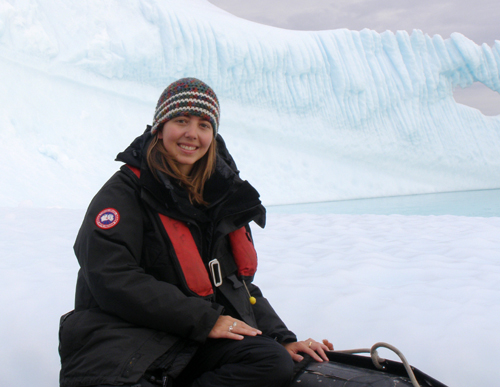
For most people, taking a cruise means vacation time. For Guelph student Brittany Manley, setting sail for the Arctic or Antarctic as soon as this year will be mostly business.
As one of the first students in U of G’s new master’s program in tourism management, she will study the educational side of expedition cruising near both poles.
She expects her study will help expedition companies better tailor their programs to prospective cruise clients as growing numbers of tourists look to experience the geography and wildlife of Earth’s northern and southern extremes.
Almost 35,000 tourists visited Antarctica in 2012-13, up from about 7,500 people a decade earlier, according to the International Association of Antarctica Tour Operators. Comparable figures are lacking for the Arctic, but Manley says more potential tourists are also looking northward.
She’s especially interested in the benefits of educational programs as potential draws for cruise customers.
Says her co-supervisor, Prof. Statia Elliot, Hospitality and Tourism Management (HTM): “The cruise sector is growing very rapidly. It used to be that a cruise was something only a few people would take, once in a lifetime and at an older age.
“We’re seeing the whole cruise segment grow extensively because people are taking cruises at a younger age, and after they’ve taken one, chances are they will take repeat cruises, including niche cruises. For Canada, this is really our segment where we have an opportunity on the industry side.”
Arctic and Antarctic cruises focus on education and science, with hired experts discussing wildlife and the landscape and seascape, says Manley. “People have a passion to learn, they want to attend lectures.”
She hopes to learn more about what attracts those clients and how well the educational programs offered by cruise companies meet their expectations.
Manley plans to survey guests of about half a dozen companies. She will observe and interview passengers aboard ships and survey passengers after their trip. She hopes to visit the Arctic this summer and the Antarctic in late 2014 and early 2015.
About 50 companies run Antarctic treks aboard cruise ships, yachts and ice-breakers. The Antarctic Peninsula is the main destination, with cruises embarking from Argentina, Chile, Australia and New Zealand.
Part of the allure of polar cruises stems from the remoteness and lack of human habitation — apart from scientific crews in research stations. Termed “last-chance” tourism, these treks allow customers to see parts of the planet that remain relatively free of human impacts, Manley says.
“It’s the last untouched place. There’s a lot of unique wildlife.”
Manley is one of four students enrolled in Guelph’s master’s program in tourism management, introduced this year. U of G’s long-standing MBA program in tourism and hospitality management focuses on operations; this new M.Sc. program emphasizes research, says Elliot.
Besides Manley’s work on cruising, other students are looking at topics in destination marketing and accommodation management.
U of G also offers a PhD in tourism management.
Manley completed an undergrad in tourism management at Guelph in 2010, including working on a wine segmentation study with Elliot.
One summer, she spent three months aboard the Lyubov Orlova in the Arctic, working in bar management and hotel services for about 100 passengers.
That’s where she met her co-supervisor, Prof. Shoshanah Jacobs, Department of Integrative Biology.
Appointed as a U of G professor last year, Jacobs runs her own expedition company. She was working on the same ship that summer as a wildlife lecturer.
That ice-strengthened ship was built for a Russian company. After numerous cruises to both the Arctic and Antarctic, the ship was seized in 2010 at St. John’s, Nfld., for non-payment of debt. Sold and destined for scrap, the ship broke away from its moorings; it’s now afloat in the Atlantic Ocean as what Manley calls a “ghost ship.”
Manley has also cruised in the Caribbean.
She was born in California. When she was nine, her family moved to St. Joseph Island in northern Lake Huron.
Family vacations often involved motoring from the West Coast to the eastern states, she says, “just exploring, getting to know the people wherever we went, seeing the beauty.”